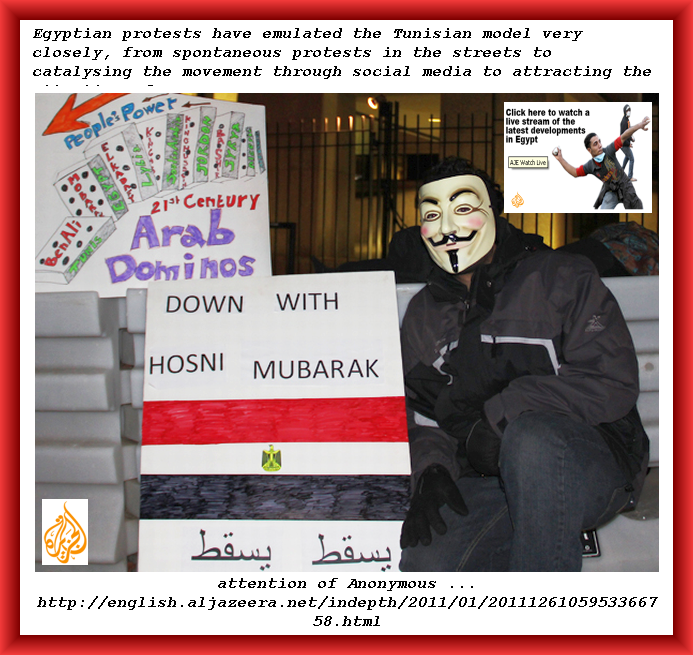REVOLUTION: Can Egyptians revolt?
Ben C. Nelson | 28.01.2011 23:45 | Guantánamo | Palestine | Repression | Social Struggles | Cambridge

DOWN WIT HOSNI-MUBARAK
 http://english.aljazeera.net/indepth/2011/01/2011126105953366758.html ......... Still, Egypt is not like Tunisia. Many renowned Egyptian analysts disappointedly noted that Egypt will not follow the Tunisian model because of the low levels of literacy among its population, the spread of apathy and defeatism among its citizens, and the negative role played by religious groups inside the country. In this respect, analysts described Egypt as a country increasingly divided along religious lines, Copts versus Muslims and competing Islamist groups against each other. Still, the events of January 25 will make many rethink their understanding of Egypt and ask again if Egyptians can revolt. Time will only tell.
http://english.aljazeera.net/indepth/2011/01/2011126105953366758.html ......... Still, Egypt is not like Tunisia. Many renowned Egyptian analysts disappointedly noted that Egypt will not follow the Tunisian model because of the low levels of literacy among its population, the spread of apathy and defeatism among its citizens, and the negative role played by religious groups inside the country. In this respect, analysts described Egypt as a country increasingly divided along religious lines, Copts versus Muslims and competing Islamist groups against each other. Still, the events of January 25 will make many rethink their understanding of Egypt and ask again if Egyptians can revolt. Time will only tell.  http://english.aljazeera.net/indepth/2011/01/2011126105953366758.html
http://english.aljazeera.net/indepth/2011/01/2011126105953366758.html Live Stream of the LATEST developments in Egypt:
 http://english.aljazeera.net/watch_now/
http://english.aljazeera.net/watch_now/ Picture: ....... Egyptian protests have emulated the Tunisian model very closely, from spontaneous protests in the streets to catalysing the movement through social media to attracting the attention of Anonymous ...
 http://english.aljazeera.net/indepth/2011/01/2011126105953366758.html
http://english.aljazeera.net/indepth/2011/01/2011126105953366758.html
Ben C. Nelson